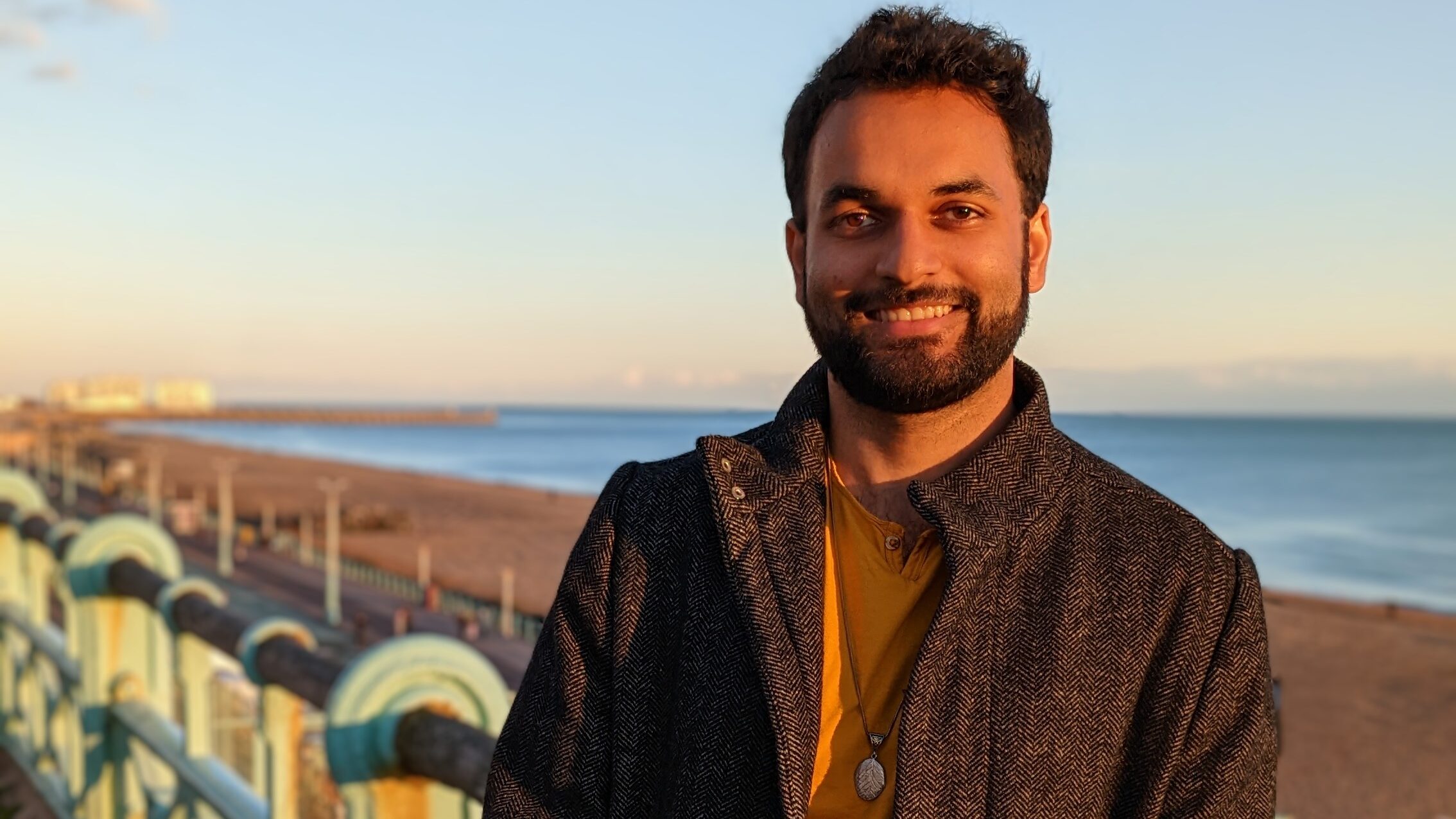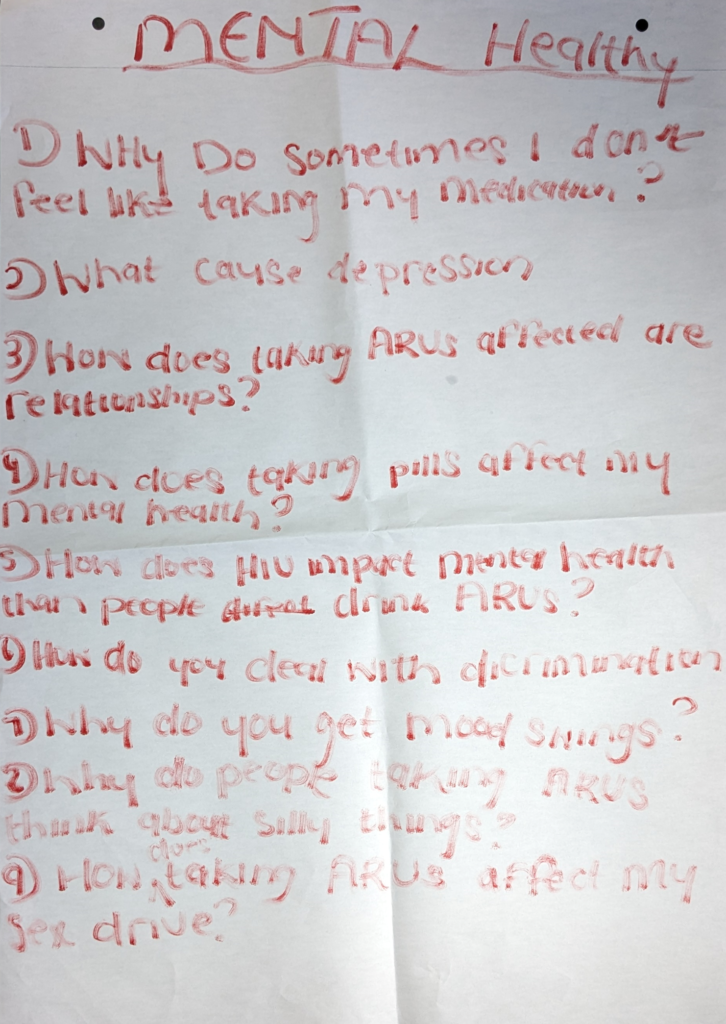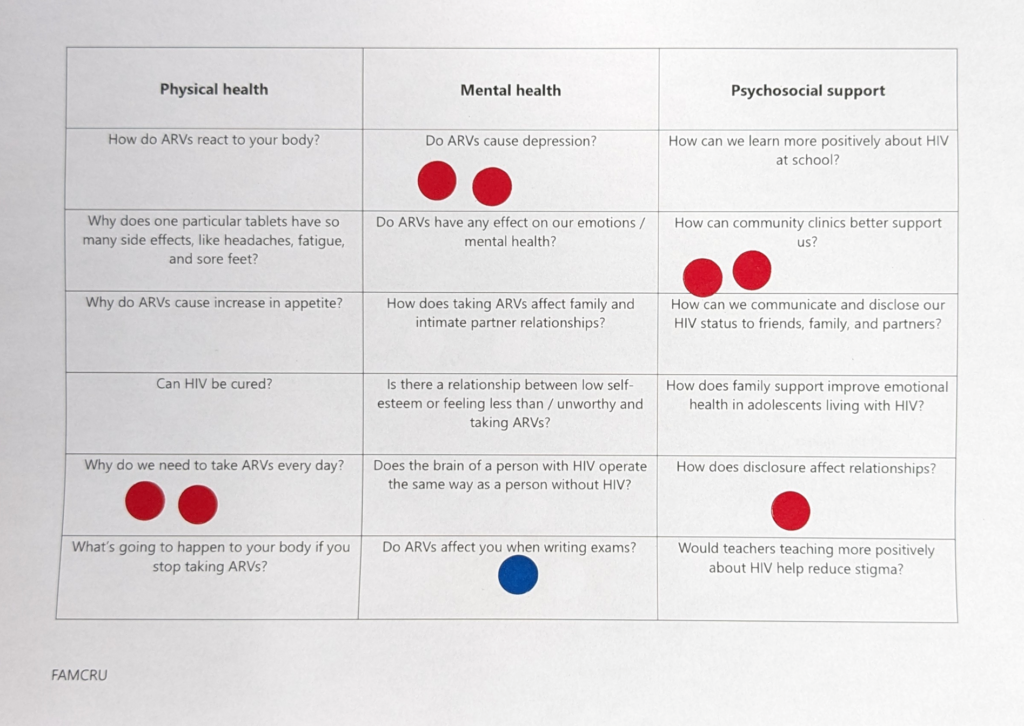Developing community-led global health research priorities

Arish Mudra Rakshasa-Loots is currently completing a PhD in Translational Neuroscience at the University of Edinburgh. His primary research interest is in understanding how brain health interacts with immune dysfunction to give rise to mental health conditions. In his PhD, Arish has been investigating whether inflammation arising due to HIV infection might contribute to the increased risk for depression among people living with HIV. Arish is a neuroscientist by training, but he works collaboratively with clinicians and researchers at several institutions in the UK and South Africa on global health research projects. In this blog post, he discusses his research, running a community engagement workshop in South Africa, and challenges facing researchers in the Global South.
Understanding the priorities of young people with HIV and their caregivers
As someone who grew up in the Global South myself, I am strongly committed to making sure that our research truly benefits the communities in which we work. One way to do this is to take lead from the community about their research priorities through priority setting workshops. These workshops can help us design research studies which authentically respond to the needs of the community, rather than assuming that we (as researchers) understand their priorities.
Together with my colleagues at Stellenbosch University’s Family Centre for Research with Ubuntu (FAMCRU), I hosted such a workshop in Cape Town last year. We asked a (relatively) simple question: what do young people living with HIV, and their parents or caregivers, want us to research? Despite heavy rains in Cape Town impacting public transportation on the day, 19 young people and their carers showed up for our workshop. We spent the day together talking about research questions which mattered to each group, and attendees later voted on the order of importance of each of the questions which they had identified.

Young people with HIV and their caregivers separately came up with research questions which mattered to them around HIV-related physical health, mental health, and psychosocial support.
We learned that finding a cure for HIV remains the most important research priority for young people living with HIV. These young people were also interested in how the antiretroviral medications which they take every day impact their brain, their body, and their social relationships. Their caregivers were interested in ways of making sure that their children remember to take their medications on schedule, dealing with the mental health impacts of someone disclosing their HIV status without their consent, and improving the support they receive from local community clinics.

Attendees later voted on the order of importance of these questions. Everyone got an equal number of stickers which they could “spend” on each question depending on how important they considered it, and we tallied the votes received for all questions to identify the overall order of importance.
Sharing insights with other HIV researchers
Understanding the research priorities of young people with HIV was really useful for us, since FAMCRU is a research clinic specialising in clinical trials for HIV treatment and prevention among young people. But there are many others working on research involving young people with HIV across South Africa and beyond, and we knew that these insights might be helpful for them as well. I put together a brief article sharing the research priorities identified by attendees in our workshop, taking care not to amend any phrasing used by our attendees.
Exercises in engaging with people who have relevant lived experience do not always make it to publication, especially when they do not involve large-scale or multi-country consultation, but we were confident that our findings were important and deserved to be shared with other HIV researchers to inform future research design. Thanks to a quick peer review process – and overwhelmingly positive reviews – we published the outcomes from our workshop in a leading global health journal last month. From hosting the workshop in July to publication in December, this has perhaps been the fastest full life cycle among all my projects!
Challenges for Global South researchers
In designing and delivering this workshop, I came up against an interesting barrier, which may be all too familiar for folks who do community engagement work in the Global South: no one was certain whether our workshop was “research”, and therefore whether it needed ethical approval.
Community engagement exercises are often considered exempt from formal ethical review in the Global North, but these approaches are relatively newer in the Global South, so people have generally erred on the side of caution and sought formal approval. As one might imagine, this becomes a source of inequity for researchers in the Global South, who have to complete extra administrative steps for community engagement compared to their colleagues in the Global North.
I met with senior leaders in our research clinic to provide a case for why this workshop was different from “research”, based on guidelines for public engagement with research developed last year by the Edinburgh Medical School Research Ethics Committee (EMREC). We also wrote a letter to the ethics review board outlining these arguments. Fortunately, the ethics board agreed and we hosted our priority setting workshop without formal ethical review – which seems to be the first such example in southern Africa. We hope this “case study” becomes the evidence necessary for others in the Global South to conduct similar workshops responsibly and ethically but without needing formal ethical review.
| Research participation | Community involvement in research |
|---|---|
| Strictly defined procedures | Unstructured or semi-structured discussions |
| Researcher tells participants what to do – participants are passively engaged | Attendees determine the direction and level of their involvement – attendees are actively engaged |
| May involve exposure to new or experimental procedures | Only involves “daily” activities such as virtual or in-person conversations |
| Primary outcome is data obtained from participant | Primary outcome is increased understanding, trust, and transparency between researchers and community members |
| Participants’ responses or interviews are recorded, transcribed, and analysed | Meeting notes are taken but conversations are not recorded, transcribed, or analysed |
What’s next?
Our publication from this priority setting workshop is now publicly available at PLOS Global Public Health:
Taking lead from the community: What do young people living with HIV want us to research?
We are now sharing these findings with other HIV researchers through relevant conferences, so that as many future studies as possible can integrate the priorities of young people with HIV in their design. Showing that people with relevant lived experience truly care about the questions we are proposing to investigate can offer an important advantage in funding applications, and most importantly, help our research respond directly to community needs.

